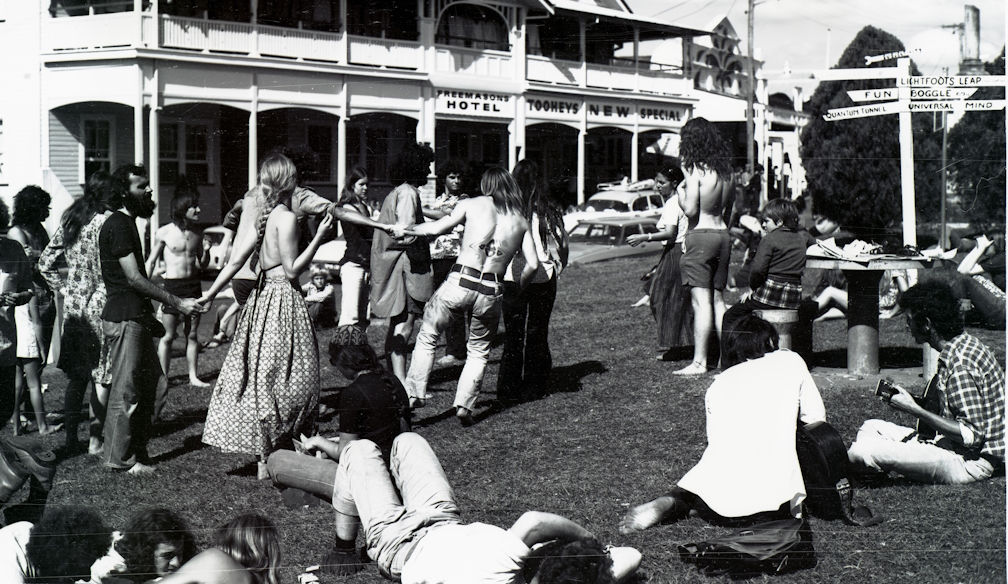Aquarius Festival doco to open Byron Bay Film Festival

The Opening Night film at this year’s Byron Bay Film Festival is a feature-length documentary that captures and celebrates a defining event in the history of the Northern Rivers – the 1973 Aquarius Festival.
The film, Aquarius, directed by local filmmaker Wendy Champagne, is sub-titled ‘Dreamers, Tree-huggers and Radical Ratbags’, 10,000 of whom descended on the sleepy hinterland township of Nimbin, introducing sometimes unwelcome new ideas and behaviours such as drug use, free love and hedonism. The inflow of a revolutionary agenda, weird sounds and psychedelic aesthetic transformed the moribund dairy and banana growing community into the vibrant rainbow region that still exists today.
Many of the newcomers stayed, strengthening the burgeoning environmental, anti-war, Aboriginal rights and feminist movements, and giving the Northern Rivers a reputation as a haven of social and cultural free-thinking that has attracted similar-minded seekers from all over the world ever since.
“[The Festival] attracted visionaries and prophets, pioneers, who could see the vision and knew how to work for it, and also the people who wanted to be saved, people who were falling and wanted a new kind of community to live in,” says its director, Graeme Dunstan, still a resident in the area.
The hippies didn’t so much “find” Nimbin, Dunstan says, as they were called there, into the heart of ancient initiation country.
Champagne is an award-winning writer and documentary filmmaker whose film BAS! Beyond the Red Light, a study of child-trafficking, opened the Byron Bay Film Festival in 2010.
To make Aquarius, the Byron Shire resident says she spent three years finding storytellers and gathering and stitching together archive footage to chronicle all the excitement and chaos of the festival.
The Opening Night film at this year’s Byron Bay Film Festival is a feature-length documentary that captures and celebrates a defining event in the history of the Northern Rivers – the 1973 Aquarius Festival.
The film, Aquarius, directed by local filmmaker Wendy Champagne, is sub-titled ‘Dreamers, Tree-huggers and Radical Ratbags’, 10,000 of whom descended on the sleepy hinterland township of Nimbin, introducing sometimes unwelcome new ideas and behaviours such as drug use, free love and hedonism. The inflow of a revolutionary agenda, weird sounds and psychedelic aesthetic transformed the moribund dairy and banana growing community into the vibrant rainbow region that still exists today.
Many of the newcomers stayed, strengthening the burgeoning environmental, anti-war, Aboriginal rights and feminist movements, and giving the Northern Rivers a reputation as a haven of social and cultural free-thinking that has attracted similar-minded seekers from all over the world ever since.
“[The Festival] attracted visionaries and prophets, pioneers, who could see the vision and knew how to work for it, and also the people who wanted to be saved, people who were falling and wanted a new kind of community to live in,” says its director, Graeme Dunstan, still a resident in the area.
The hippies didn’t so much “find” Nimbin, Dunstan says, as they were called there, into the heart of ancient initiation country.
Champagne is an award-winning writer and documentary filmmaker whose film BAS! Beyond the Red Light, a study of child-trafficking, opened the Byron Bay Film Festival in 2010.
To make Aquarius, the Byron Shire resident says she spent three years finding storytellers and gathering and stitching together archive footage to chronicle all the excitement and chaos of the festival.
Her nostalgic, moving and often funny film chronicles the Festival’s initial welcome by the town copper and members of the local farming and business community who were happy to see an influx of young people, and the money they’d bring. Problems inevitably arose as the vice squad began to snoop around, confirming the anxieties of some Nimbin old-timers as they witnessed their village’s shopfronts morph into swirly patterns and hallucinogenic day-glo, and long-haired lovelies of all genders swim naked in the creeks.
The footage of plain-clothed policemen standing around awkwardly disguised in what they imagined was “hippie” clothing is hilarious, but things got seriously gnarly at times, and the debates and divisions about how to deal with the Man were sometimes heated.
Champagne collaborated extensively with festival-goers, organisers and video and film groups to uncover hours of precious, candid footage for an intimate look at the pre-Festival quest, when its student founders were scouting the country in search of a suitable site, through to following up on the dreamers and dropouts featured in the film “who settled here in the Northern Rivers in the 1970s and still benefit from their environmental and social victories”.
“The film pays tribute to them, and to protest," she says. "It shows what can be achieved with audacity, a strong community and a little bit of crazy.”
She hopes Aquarius will reach a younger audience who are facing the same issues as previous generations of protestors.
One of the Festival’s legacies noted in the film is the mass turn-out of local environmental foot soldiers in opposition to the fracking corporations and their goons at Bentley 40 years later – a people-powered victory that embodied all the highest values of the Nimbin crowd, turning on and tuning in to a new way of relating to nature.
Festival-goers and their children and grandchildren still inhabit the region, continuing the hippie legacy in communities and communes from Murwillumbah to Wardell, and the film provides a sentimental journey, a celebration of arguably more innocent times, and a rallying cry for a future marked by greater harmony and understanding.
Producer Sam Griffin says the film, “like all good ideas, was a confluence of several things”: a reaction to the Netflix series Byron Baes, the 50th anniversary of the original Aquarius festival, and executive producer and “bit of an old hippie” Chris Hilton connecting with Champagne, “a wonderful local writer and director who had a similar sensibility”.
“Visually this film is so rich,” Griffin says, “uncovering archive that had never been seen before from filmmakers who were in some cases using very new forms of technology.”
The film has its Byron premiere at BBFF in October and has had a great festival run so far, says Griffin. The filmmaking team is excited that Aquarius is the opening night film at Byron Bay Film Festival and “playing to a fantastic home crowd!” she says.
“It’s also a great way to kick off our cinema release with Madman, which starts on November 14.”
BBFF director J’aimee Skippon-Volke says local stories and locally produced work are at the heart of the Byron Bay Film Festival’s framework this year “more than ever”.
“The Aquarius documentary is the perfect Opening Night film, celebrating what makes the rainbow region so special. At a time when many local people feel that our sense of community has been diminished, I believe our festival serves as a vital focal point, bringing us together to explore what matters, support our creative community, and reconnect.”
The Opening Night Gala Party will be a celebration of the film and all things Aquarius, so the audience is asked to frock up in their most vibrant summer of love attire, join their fellow dreamers and let the festival spirit shine!
The 18th Byron Bay Film Festival’s Opening Night film and Gala Party takes place on Friday, October 18 at Byron Palace Cinemas.
Visit www.bbff.com.au for more information or contact
